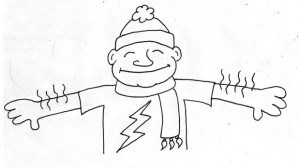 Ever heard of “Musical Frisson”? Even if you haven’t, you’ll know what I mean in a second. Its that tingly feeling that shoots through your body.
Ever heard of “Musical Frisson”? Even if you haven’t, you’ll know what I mean in a second. Its that tingly feeling that shoots through your body.
Triggered by your favourite songs, or types of music. The lovely sensation will often shoot down the spine and out across your limbs in a shiver of ecstacy.
What the heck is going on there, and why is it happening?!
Researchers at the Montreal Neurological Institute at McGill decided to tackle this question. By monitoring people brains as they listened to their favourite tunes, the figured it out! The music was stimulating the same reward circuits as food, intimacy, and drugs.
The human brain has evolved to reinforce adaptive behaviours such as eating and reproduction; so when people eat or are intimate, the brain releases the pleasure drug dopamine to reinforce that behaviour. Some drugs also cause dopamine to be released. – Valorie Salimpoor
But when their team used Positron Emission Tomography, or PET, to watch what happened in people’s brains when they listened to music they considered “intensely pleasurable,” they saw the same chain of events occur.
Different parts of songs triggered different kinds of reactions in the brain. Throughout the song, dopamine was dispersed at specific parts, all measuring peak emotional points.
“Right before people experience that peak emotional response, which in our experience was measured with chills, participants show dopamine release in a different region of the reinforcement circuit and this is the caudate nucleus,” said Salimpoor on CBC’s Quirks & Quarks.
“It suggests that aesthetic stimuli can actually work on this system that’s there to reinforce biologically adaptive behaviours,” she says. “And the fact that an intellectual reward that’s housed in the prefrontal cortex can stimulate this part of our brain, it almost suggests that as human beings we’ve been evolved to appreciate aesthetic stimuli.”Valorie Salimpoor
This shows that we might have actually evolved to love music. The chills or tremors sent through your body is a good thing. Its a kind of positive reenforcement from your body saying – “Yes, thats good. Do it again.”
Music lessons 101: a guide for parents
 Your child, who loves to sing and dance, seems to show an interest in playing an instrument. She loves banging on Grandma’s old piano each time you visit. Is it time to start formal music lessons?
Your child, who loves to sing and dance, seems to show an interest in playing an instrument. She loves banging on Grandma’s old piano each time you visit. Is it time to start formal music lessons?
In this series of posts, I hope to simplify your decision making process. Parents often jump into the world of lessons without considering the big picture, and many students only play for a few years before quitting in frustration. If you know how to choose the right instrument, when to start and how you can support your child, music lessons can be a rewarding experience for your entire family. Via Viva Piano
When to Start Music Lessons for Your Child
The music world is full of child prodigies. Mozart made his debut as a concert pianist at age four and Chopin made his at seven. Outside of classical music, LeAnn Rimes had won two Grammy awards by age 14, and, of course, Michael Jackson was singing and dancing his way into American history by age five. Via Parenting Pad

